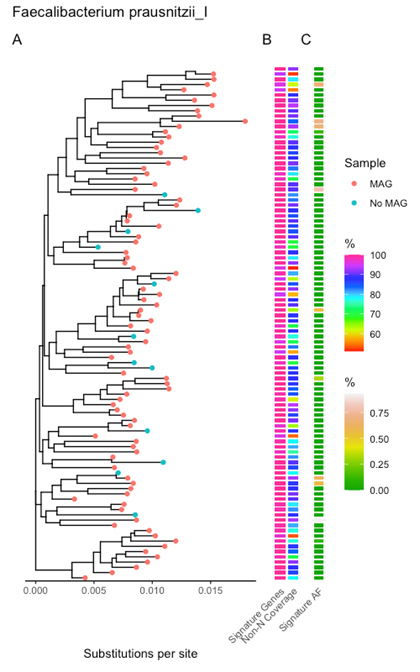Strain-link: Linking strain-level functional inference and development in the early life microbiome with later disease
Background:
Microbes inhabit all types of environments and form complex communities, called microbiomes. The human microbiome has a great impact on host health, which is directly linked to the specific composition and functional content of the microbes. It is known that specifically Bifidobacterium subspecies is able to degrade specific human milk oligosaccharides, which is beneficial for breast-fed infants. This function may have long term implications for immune maturation and later risk of disease for the child.
Data:
The analysis will be based on a gut microbiome dataset from COPSAC2010. It consists of metagenomic sequencing data from the same children taken at three timepoints: 1 month, 1 year and 10 years.
Objectives:
Community-based analysis
The initial part of the project will be to quantify all the metagenome assembled genomes (MAGs) and create SNV-level phylogenetic trees based on signature genes using MAGinator. From these, tree-topology clades will be identified and quantified.
These clades will be used to infer functions from the high-quality MAGs to the low-abundant samples. To do so we will need to functionally annotate the MAGs (e.g. using eggNOG mapper) and impose them on the tree.
Some bacterial species are more conserved than others, and we might only be able to infer functions according to the tree-topology for certain taxonomic groups.
A longitudinal analysis will be carried out to examine whether the MAGs cluster according to timepoint, individual child, or both. The functional profiles of the three timepoints will also be compared.
Case-study diving into Bifidobacterium MAGs
To gain an overview of the presence of the Bifidobacterium genus a phylogenetic tree of all Bifidobacterium MAGs should be created. The functions will be imposed on the tree. Are any functions species-specific? If yes, can we dive deeper and identify any clade-specific functions? Does co-existence of the Bifidobacterium MAGs lead to interaction and metabolic cooperation within a single child?
As Bifidobacterium are known to be closely linked with health status of infants, we will associate their abundances and functions with environmental exposures (e.g. siblings/antibiotics) and health outcomes including infections and asthma.
Skills involved:
- R or Python
- Bash scripting
- Running jobs on compute cluster (e.g. Computerome)
- Phylogeny, tree-construction and statistical analysis
7.5 ECTS “project outside the scope”, with the strong possibility to extend into a 30 ECTS full time MSc thesis project
Applicants should provide a CV with all relevant coursework and grades, computational proficiency, and any prior professional experience.
For more information, please contact:
Urvish Trivedi (urvish.trivedi@bio.ku.dk)
Trine Zachariasen (trine.zachariasen@bio.ku.dk)

Topics
Section of Microbiology

Contact
Section of Microbiology
Universitetsparken 15, build. 1, 1. floor DK-2100 Copenhagen
Assistant Professor Urvish Trivedi
E-mail: urvish.trivedi@bio.ku.dk
